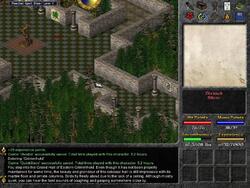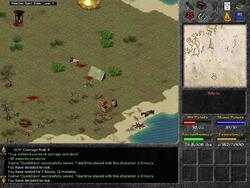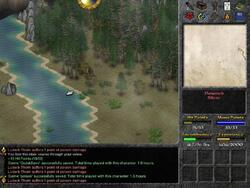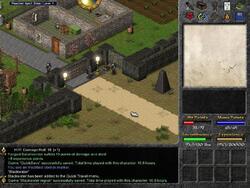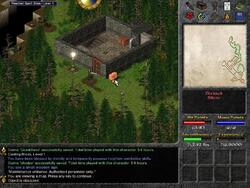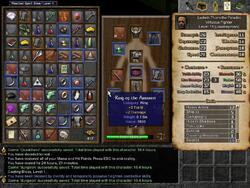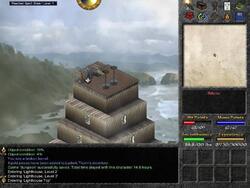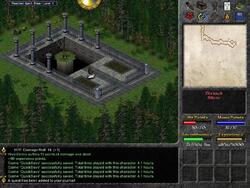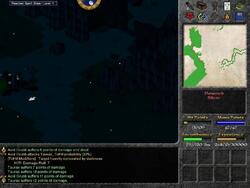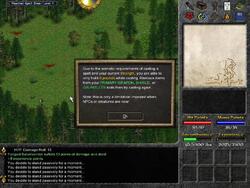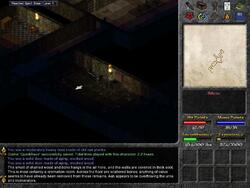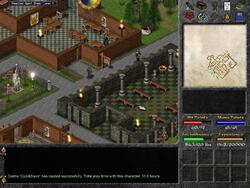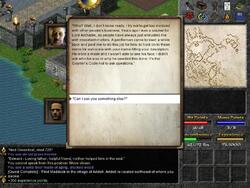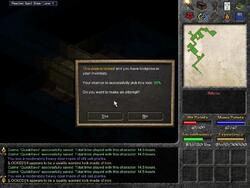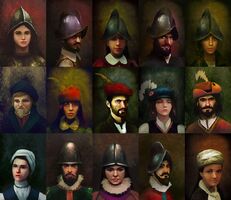Eschalon Review
Eschalon Review
Review - posted by Elwro on Sat 29 March 2008, 20:08:54
Tags: Basilisk Games; Eschalon: Book IBasilisk Games are newcomers to the indie RPG development field and their debut title, Eschalon: Book One, shows a lot of promise - if you like games with a definite oldschool feel. It's far from perfect, though. Read our review to learn our thoughts on the game.
Read the full article: Eschalon Review
Read the full article: Eschalon Review
Revealed in early 2006, Eschalon: Book One is the debut title of Basilisk Games, a newcomer to the indie cRPG scene. From the get-go the game promised a non-linear story, turn-based combat, stat-heaviness and general old-school feel. But did it deliver? Continue reading to find out.
After pressing the "Begin a new adventure" button in the main menu, noticing the nice music in the background, we proceed to the character creation screen, which greets us with a sizable number of options. There are 8 primary attributes – 4 physical (Strength, Dexterity, Endurance, Speed) and 4 mental (Intelligence, Wisdom, Perception, Concentration). Base stat levels are randomly determined, after which you get to distribute 15 points among them. You can also choose your region of origin, which results in a small adjustment of the stats. A rarely-seen idea is the inclusion of "Axioms" - you can e.g. choose to be Virtuous, which means that you can cast the Bless spell without having the appropriate magical skill, but you're more susceptible to all kinds of curses. Nefarious people can't be healed by altruistic priests, but every hit they inflict has a small chance of resulting in more damage due to their malicious combat techniques. You can ignore all this by choosing to be Agnostic. All in all, the axioms only have a minimal influence on how the game plays - they do not seem to open any new dialogue paths, for example.
Next comes the choice of character class, which boils down to a free skill any other class can also buy with skill points. That's it – a fighter gets the Swords skill, the magick user gets the ability to cast Elemental spells, the rogue gets some starting knowledge in the field of lockpicking, and so on. The last part of character creation concerns choosing your starting skills (and their level) from a vast array of possibilities. There are of course a few standard combat skills, and it's wise to take at least one of them. Spellcasting is governed via Elemental and Divination skills. There are quite a few options for the rogue-inclined: Hide in Shadows, Move Silently, Skullduggery, Lockpicking... One seldom-seen skill is Cartography, the level of which directly corresponds with the quality of the automap - that's a nice touch. Alchemy is developed quite well, and if raised high enough can be quite a life saver. All in all, the skill system is not ideally balanced. A few skills have too small significance to warrant treating them as separate (Skullduggery on par with Swords?), not to mention that you can meet trainers for some of the skills in the game, which essentially means you wasted skill points spent on those skills. Still, the skill system is varied enough to enable you to make a few varied characters for different playthroughs. Just forget about the character classes. Not fully concentrating on one sphere of development (for example not making a pure tank or a rogue in terms of skills and stats) is a good idea, since noone is going to disarm traps, kill enemies or brew potions for you: there's no party in this game, it's just your character.
After creating your character and watching the briefest cRPG intro ever (the screen goes dark, the rain starts falling and a storm comes, a floating skull appears and disappears), you begin the game as an amnesia-stricken male individual (no, you can't play as a woman), inside an empty house. The only clue as to what to do is a note from a mysterious stranger, instructing you to meet a certain Maddock in a nearby village. Cliche? Sucky? Mysterious and involving? Actually, while the beginning is not the most original, the main plot (sparse as it was) managed to grab me after a while; some parts of it were pretty smart and the scarcity of info was properly justified.
The first thing you'll notice is that it takes ages to get anywhere. Walking speed is very slow and there's no 'run' option. What's worse, you can't just click a location and hope you character will walk there - he'll just move one square. To continue walking you have to either keep the LMB pressed, which is tiring after some time, or press 'w' - which toggles the 'always walk' mode - and move the mouse to change the direction of the movement. You get used to it, but I see no advantages of Eschalon's movement interface over the standard 'click and wait' method. Another issue is that if you click on a door a few steps away, the hero won't go and open it - he will stand still and wait for you to guide him. The same applies to opening containers and is needlessly annoying.
As I said, walking is very slow in the game, its speed being in no way connected with the Speed attribute. Fortunately, there are quicker modes of transportation. The first one is quick travel – if you touch a special pylon in a given location, you can always return there in a blink. The game tries to prevent you from cheating out of combat this way, but does not always succeed in doing so – e.g. you can get past a crowd of enemies waiting for you if you quicktravel before the combat starts. The second method is a spell enabling you to set a portal in a given location or to return to a portal previously set. The third one requires turning on a set of teleporters created by another species. All these methods combined make traveling easier, and even a pure tank with limited access to magic (and thus devoid of the Portal spell) will only rarely have to face the boredom of traversing some empty woods (respawning is thankfully minimal) at a snail's pace.
The basic premise is that you try to follow the mysterious stranger's notes to discover more about your identity and past. You are nonetheless quick to learn that strange things happen throughout the land – not only has the Crux of the Ages (a very important artifact for the humans of Thaermore, the region in which the game is set) been stolen, but all the armed forces keeping the vile goblins threatening Eastern Thaermore at bay have been recalled to fight the supposed thieves from a different, mysterious race. As a result, the greenies have already captured a few locations, including a fortress; you'll inevitably run into them, but your encounters won't always have to lead to brutality as the gobbos run a certain business you'll want to use.
A commendable feature of the game is its partly geography-based nonlinearity. There are only a few things you need to do to finish the game, and the order of most of them does not matter. But during your exploration of the world, you'll sooner or later want to cross some natural obstacles, e.g. a huge chasm or a mountain range blocking access to the desert. Just considering the second example, you have at least three options: finding a key (which can be easily missed, and you only have one chance to get it) to a gate in the mountains, teleporting inside (after activating the previously mentioned system of teleporters – this requires either dumb luck or discovering hints in a certain letter) or using a not-completely-obvious underground route. Multiple paths like in this example are always nice since they increase replayability. Also, a big part of the game is entirely optional – finishing the main plot with my first character took me about 20 hours and 13 experience levels; if you explore the world thoroughly there's at least 10 more hours of playtime in store for you, allowing you to advance your character by a couple more levels. I managed to find three endings – one is clearly the Good way of doing things, the second is the Bad way, and the third one is the Ultimate Badass way which includes much body-chopping. This is fun, but I have to mention that which ending you receive is decided near the finish of the game – most of the things you do during your playthrough are compatible with all endings.
As for the quests themselves, usually there's only one way of completing them. Sometimes it's painful as some entirely reasonable options haven't been included; I guess that's where the low number of people working on the game shows the most (apart from the abundance of typos). For example, you may learn that a certain respected member of the starting town community does some really bad things. And while you can tell on him, nothing happens... this wouldn't be so bad, since you can come up with a plausible explanation when you know the details, but you aren't even given an option of confronting him – no new dialogue choices appear! Another case is when some shady guy gives you a quest which involves murdering a person you've most likely gotten acquainted with by that time. Unfortunately, you can't even tell her that someone's after her life. Sadly, stats do not seem to have influence on which dialogue options you get.
There are only a few "civilized" locations to be visited, and only one of those can really be called a town. The NPCs lack a day/night cycle – shops are always open and taverns operate perpetually. The citizens have a peculiar attitude towards private property – you can take anything you want from their cupboards and closets, but picking a lock inside their house is considered a crime.
Some locations are clearly not varied enough – no one's going to convince me that putting dozens of identical opponents in an area has ever been a good idea, especially since Eschalon's way of handling conflicts is not the Baikal of cRPG combat systems in terms of depth. (More on that later.) Also, there are a few places in which you get the "something's missing here" feeling – for instance, there's a completely unusable boat near the lighthouse and an unopenable door in a certain underground location. Both were to enable access to new areas featured in a small, free expansion, which unfortunately seems to be iced as the team is working on the second part of the game.
The devs repeatedly claimed on their forums that there was no level scaling in the game. This is not entirely true. First, just to nitpick, the creatures which can ambush you during your rest become stronger as you level up, but that's a small thing. On the other hand, loot scaling is evident. Common thugs drop better and better equipment (and more of it) the more experienced you are. Chests, the contents of which are usually randomised, tend to provide mediocre loot when you're a greenhorn, and better booty when you're a seasoned veteran. This means that – aside from just a few hand-placed goodies – it's extremely hard to find really good items (weapons, amulets, recipes) when you're low level, even if you reach the last, most difficult parts of the game. I think, although I'm not 100% sure, that what shops offer is also scaled to your level – this includes alchemical components, too. Unfortunately, this results in the simple necessity of quickloading. As Eschalon does not use any kind of random seed, quickloading saves most of the problems you can encounter in the game, whether it's related to combat, lockpicking or loot. I guess some of you will say "just don't use it, it's 4 lam3rz", but quickloading is the only thing you can do (save for grinding) to combat the loot scaling. That said, if loot scaling gets removed in Eschalon 2, I think there should be a "use one random seed during the whole playthrough" option, just to fight the urge of opening all closed doors in the game with 1 lockpick. Another small bit which should be added is a keyring - right now you can have a big portion of your inventory taken up just by keys, and while I in general have nothing against the "1 item takes 1 square of inventory space regardless of its size or weight" abstraction, things change when the size of inventory is artificially limited.
To decide whether you want to trust my opinion on the visual side of the game, you need to know that – while I do not shun modern, pretty games – I regularly play ASCII titles like ADOM and consider the Avernum series pleasing to the eye. Eschalon's 800x600 (windowed or full-screen) graphics are very good for an indie title. Most impressive is the lighting effect – when the sun sets and the street lanterns start to glow you might even get some Arcanum vibes. The locations are not too varied, but everything is clearly depicted. Animation is scarce and the number of different models is low, but the general style of the game is quite appealing.
Similar remarks apply to the sound effects – there are just a few, but they're not bad. What's strange is that I have found no way to manipulate the volume of some effects, including combat sounds. There's no way to make the game run silently short of turning your speakers off or turning the system volume down. So no, you won't be able to play the game while listening to your own music in the background... unless you're fine with supplementing it with "Aargh!" sounds every once in a while. I usually turn sound off while playing indie titles, but Eschalon was different – and not only because I had to get acquainted with its sonic qualities before writing this review, but due to the fact that the game's music is damn good. It's a perfect soundtrack for the depicted locations, sets the mood properly and, while the number of tracks is quite small, manages not to become boring. And if you're interested in who the talented composer is, the name's Bjoern Lynne – somehow he doesn't seems to be credited anywhere.
I've heard people say Eschalon is "turn based", but in reality it's nothing like the "please stand still while I use my action points to get near you and whack you with my hammer" games we've all learned to love and admire. It's more similar to very simple roguelike combat – when you stand still, the world stands still with you; when you move, you don't move alone. (Sorry if you don't get the obscure reference I'm trying to make.) You try to hit someone, they attempt to fight back. Why "very simple"? One thing is that the speed mechanics are quite, um, basic. All creatures (save for a few exceptions) act with the same speed. One square of movements equals one strike. This means that fleeing and chasing often become ridiculous, as most of the time the attacker and the poor victim move with exactly the same speed. The only thing you can count on is that your AI opponent is not as effective as you at moving around the trees and other obstacles you might encounter on your way. This means that Haste potions, which double your action speed, are very powerful, and are a big reason why the Alchemy skill is a valuable one.
Another factor contributing to the simplicity of the combat is that you just don't get many options. If you have a melee weapon, you can whack your opponent with it; if you have a missile weapon, you can shoot it. That's all. If you want to cast a spell, you must watch out not to be encumbered, which is a nice touch.
Fighting is made a bit more interesting by the fact that you constantly have to take light into consideration. If you can position yourself in a dark place while your opponent stands in plain light, good for you. Sometimes it's better to fight in complete darkness, though, since you'd rather have a 8% chance to hit while your opponent has 10%, than have a 40% hit chance vs. your opponent's 60%; and yes, I've taken these numbers out of my ass but the game works similarly. You can also drink a potion of Predator Sight (or cast a similar Elemental spell) which makes enemies glow in the dark. Alchemy may enable you (if you find the recipe) to brew Demon Oil, which works like a potent Molotov Cocktail-like thrown weapon. Another nice touch is that the game tries to endow the NPCs with hearing – depending on your skill in Move Silently, what footwear you have on and how encumbered you are, you may move silently or not; and if a goblin hears a strange metallic clank he'll come to investigate it.
As I've already said, Alchemy is very powerful in the game. Apart from stat boosting, two effects I have not mentioned yet are invisibility and increasing the effectiveness of weapons – although don't be surprised if you only learn how to achieve the latter late in the game. Whether you identify an item or not depends on your Lore skill. A strange thing is that you cannot drink unidentified potions, but you can use them as alchemical ingredients, arriving at an identified potion.
So, Alchemy is potent, but are the spellcasting (Divine and/or Elemental) types on the losing side? Not really. Apart from obviously useful combat spells, there are some which mimic the effects of alchemical beverages (including invisibility, haste etc.), and others have unique effects: e.g. blessing, revealing the map, turning undead, enchanting weapons and the already mentioned teleportation. Be sure to pump up your Perception attribute (from the start), though – it seems to be the most important factor in mana regeneration. Spell scrolls are used only for learning spells, and not casting them, so you can just sell any duplicates you find.
To briefly return to the lighting issue, the game emphasizes the now-forgotten belief that when it's night, it's dark. And usually, you don't see things in the dark. You really need some light source in this game. You can cast a spell, but if you're a melee type, you'll perhaps need to hold a torch in one hand – which means foregoing using a shield. There are torches on some walls in the dungeons, and by lighting or putting them out you can make some areas lit or hidden in darkness, which has a direct influence on stealth and combat.
Eschalon is a stat-heavy game, as it was advertised. Want to learn a spell from a scroll? Requires a certain level of Intelligence. Want to learn an enigmatic inscription in an old language? That's a test for your Wisdom. (Too bad it doesn't happen more often.) Disarming traps, hiding in shadows, fighting poison and paralysis, casting spells... just about any possible activity in the game (save for dialogue) is governed by a combination of stats, which should tickle the fancy of any old-school RPG fan. But, since Eschalon is such a stat-heavy game, it should definitely provide the player with more detailed info about its mechanics. In such a title you want to carefully plan ahead and calculate as much as you can, and for this you need to know the exact formulas describing the way derived attributes depend on primary stats. Such things should be transparent. The sparse manual doesn't help, either - especially as it lacks even the most basic info on a few topics, for example diseases. Tough noogies, I guess.
For a concluding technical remark, the game may run fine on a PC not meeting the minimum requirements - I played a significant part of it on an old Athlon 1400 without any problems. Some folks will be happy to know that Eschalon's available for Mac and Linux, too. The game didn't even crash once in the circa 30 hours I've devoted to it.
To sum up, Eschalon: Book One shows that its makers, Basilisk Games, definitely have the potential to make a great, old-school cRPG title. The main fault of their first game is that it's not really fleshed out. The bits of lore we get to learn are interesting, but, well, they're exactly that – just tiny bits. Dialogue is too scarce, and a stat-heavy game really should provide some dialogue options which would appear only for PCs with the proper combination of attributes. There's too little choice in the quests. Some locations feel empty. Dungeon descriptions are a nice touch, but they come up infrequently. But the rest forms a really enjoyable fantasy cRPG, fit for a replay or two. Be sure to try the demo. And my opinion is that $27.95 for the downloadable version is a good price - I'll certainly be trying the game with different characters.
All in all, Eschalon: Book One is a very promising first title from a small team. I hope Basilisk Games learn from their debut game's faults and produces a more fleshed out sequel, either concentrating on providing a bigger number of quest-related options or on building more tactical options into the combat system – ideally on both of these things!
Thanks to Rulion, who made this review possible, and to Claw, who provided me with one of his savegames!
After pressing the "Begin a new adventure" button in the main menu, noticing the nice music in the background, we proceed to the character creation screen, which greets us with a sizable number of options. There are 8 primary attributes – 4 physical (Strength, Dexterity, Endurance, Speed) and 4 mental (Intelligence, Wisdom, Perception, Concentration). Base stat levels are randomly determined, after which you get to distribute 15 points among them. You can also choose your region of origin, which results in a small adjustment of the stats. A rarely-seen idea is the inclusion of "Axioms" - you can e.g. choose to be Virtuous, which means that you can cast the Bless spell without having the appropriate magical skill, but you're more susceptible to all kinds of curses. Nefarious people can't be healed by altruistic priests, but every hit they inflict has a small chance of resulting in more damage due to their malicious combat techniques. You can ignore all this by choosing to be Agnostic. All in all, the axioms only have a minimal influence on how the game plays - they do not seem to open any new dialogue paths, for example.
Next comes the choice of character class, which boils down to a free skill any other class can also buy with skill points. That's it – a fighter gets the Swords skill, the magick user gets the ability to cast Elemental spells, the rogue gets some starting knowledge in the field of lockpicking, and so on. The last part of character creation concerns choosing your starting skills (and their level) from a vast array of possibilities. There are of course a few standard combat skills, and it's wise to take at least one of them. Spellcasting is governed via Elemental and Divination skills. There are quite a few options for the rogue-inclined: Hide in Shadows, Move Silently, Skullduggery, Lockpicking... One seldom-seen skill is Cartography, the level of which directly corresponds with the quality of the automap - that's a nice touch. Alchemy is developed quite well, and if raised high enough can be quite a life saver. All in all, the skill system is not ideally balanced. A few skills have too small significance to warrant treating them as separate (Skullduggery on par with Swords?), not to mention that you can meet trainers for some of the skills in the game, which essentially means you wasted skill points spent on those skills. Still, the skill system is varied enough to enable you to make a few varied characters for different playthroughs. Just forget about the character classes. Not fully concentrating on one sphere of development (for example not making a pure tank or a rogue in terms of skills and stats) is a good idea, since noone is going to disarm traps, kill enemies or brew potions for you: there's no party in this game, it's just your character.
After creating your character and watching the briefest cRPG intro ever (the screen goes dark, the rain starts falling and a storm comes, a floating skull appears and disappears), you begin the game as an amnesia-stricken male individual (no, you can't play as a woman), inside an empty house. The only clue as to what to do is a note from a mysterious stranger, instructing you to meet a certain Maddock in a nearby village. Cliche? Sucky? Mysterious and involving? Actually, while the beginning is not the most original, the main plot (sparse as it was) managed to grab me after a while; some parts of it were pretty smart and the scarcity of info was properly justified.
The first thing you'll notice is that it takes ages to get anywhere. Walking speed is very slow and there's no 'run' option. What's worse, you can't just click a location and hope you character will walk there - he'll just move one square. To continue walking you have to either keep the LMB pressed, which is tiring after some time, or press 'w' - which toggles the 'always walk' mode - and move the mouse to change the direction of the movement. You get used to it, but I see no advantages of Eschalon's movement interface over the standard 'click and wait' method. Another issue is that if you click on a door a few steps away, the hero won't go and open it - he will stand still and wait for you to guide him. The same applies to opening containers and is needlessly annoying.
As I said, walking is very slow in the game, its speed being in no way connected with the Speed attribute. Fortunately, there are quicker modes of transportation. The first one is quick travel – if you touch a special pylon in a given location, you can always return there in a blink. The game tries to prevent you from cheating out of combat this way, but does not always succeed in doing so – e.g. you can get past a crowd of enemies waiting for you if you quicktravel before the combat starts. The second method is a spell enabling you to set a portal in a given location or to return to a portal previously set. The third one requires turning on a set of teleporters created by another species. All these methods combined make traveling easier, and even a pure tank with limited access to magic (and thus devoid of the Portal spell) will only rarely have to face the boredom of traversing some empty woods (respawning is thankfully minimal) at a snail's pace.
The basic premise is that you try to follow the mysterious stranger's notes to discover more about your identity and past. You are nonetheless quick to learn that strange things happen throughout the land – not only has the Crux of the Ages (a very important artifact for the humans of Thaermore, the region in which the game is set) been stolen, but all the armed forces keeping the vile goblins threatening Eastern Thaermore at bay have been recalled to fight the supposed thieves from a different, mysterious race. As a result, the greenies have already captured a few locations, including a fortress; you'll inevitably run into them, but your encounters won't always have to lead to brutality as the gobbos run a certain business you'll want to use.
A commendable feature of the game is its partly geography-based nonlinearity. There are only a few things you need to do to finish the game, and the order of most of them does not matter. But during your exploration of the world, you'll sooner or later want to cross some natural obstacles, e.g. a huge chasm or a mountain range blocking access to the desert. Just considering the second example, you have at least three options: finding a key (which can be easily missed, and you only have one chance to get it) to a gate in the mountains, teleporting inside (after activating the previously mentioned system of teleporters – this requires either dumb luck or discovering hints in a certain letter) or using a not-completely-obvious underground route. Multiple paths like in this example are always nice since they increase replayability. Also, a big part of the game is entirely optional – finishing the main plot with my first character took me about 20 hours and 13 experience levels; if you explore the world thoroughly there's at least 10 more hours of playtime in store for you, allowing you to advance your character by a couple more levels. I managed to find three endings – one is clearly the Good way of doing things, the second is the Bad way, and the third one is the Ultimate Badass way which includes much body-chopping. This is fun, but I have to mention that which ending you receive is decided near the finish of the game – most of the things you do during your playthrough are compatible with all endings.
As for the quests themselves, usually there's only one way of completing them. Sometimes it's painful as some entirely reasonable options haven't been included; I guess that's where the low number of people working on the game shows the most (apart from the abundance of typos). For example, you may learn that a certain respected member of the starting town community does some really bad things. And while you can tell on him, nothing happens... this wouldn't be so bad, since you can come up with a plausible explanation when you know the details, but you aren't even given an option of confronting him – no new dialogue choices appear! Another case is when some shady guy gives you a quest which involves murdering a person you've most likely gotten acquainted with by that time. Unfortunately, you can't even tell her that someone's after her life. Sadly, stats do not seem to have influence on which dialogue options you get.
There are only a few "civilized" locations to be visited, and only one of those can really be called a town. The NPCs lack a day/night cycle – shops are always open and taverns operate perpetually. The citizens have a peculiar attitude towards private property – you can take anything you want from their cupboards and closets, but picking a lock inside their house is considered a crime.
Some locations are clearly not varied enough – no one's going to convince me that putting dozens of identical opponents in an area has ever been a good idea, especially since Eschalon's way of handling conflicts is not the Baikal of cRPG combat systems in terms of depth. (More on that later.) Also, there are a few places in which you get the "something's missing here" feeling – for instance, there's a completely unusable boat near the lighthouse and an unopenable door in a certain underground location. Both were to enable access to new areas featured in a small, free expansion, which unfortunately seems to be iced as the team is working on the second part of the game.
The devs repeatedly claimed on their forums that there was no level scaling in the game. This is not entirely true. First, just to nitpick, the creatures which can ambush you during your rest become stronger as you level up, but that's a small thing. On the other hand, loot scaling is evident. Common thugs drop better and better equipment (and more of it) the more experienced you are. Chests, the contents of which are usually randomised, tend to provide mediocre loot when you're a greenhorn, and better booty when you're a seasoned veteran. This means that – aside from just a few hand-placed goodies – it's extremely hard to find really good items (weapons, amulets, recipes) when you're low level, even if you reach the last, most difficult parts of the game. I think, although I'm not 100% sure, that what shops offer is also scaled to your level – this includes alchemical components, too. Unfortunately, this results in the simple necessity of quickloading. As Eschalon does not use any kind of random seed, quickloading saves most of the problems you can encounter in the game, whether it's related to combat, lockpicking or loot. I guess some of you will say "just don't use it, it's 4 lam3rz", but quickloading is the only thing you can do (save for grinding) to combat the loot scaling. That said, if loot scaling gets removed in Eschalon 2, I think there should be a "use one random seed during the whole playthrough" option, just to fight the urge of opening all closed doors in the game with 1 lockpick. Another small bit which should be added is a keyring - right now you can have a big portion of your inventory taken up just by keys, and while I in general have nothing against the "1 item takes 1 square of inventory space regardless of its size or weight" abstraction, things change when the size of inventory is artificially limited.
To decide whether you want to trust my opinion on the visual side of the game, you need to know that – while I do not shun modern, pretty games – I regularly play ASCII titles like ADOM and consider the Avernum series pleasing to the eye. Eschalon's 800x600 (windowed or full-screen) graphics are very good for an indie title. Most impressive is the lighting effect – when the sun sets and the street lanterns start to glow you might even get some Arcanum vibes. The locations are not too varied, but everything is clearly depicted. Animation is scarce and the number of different models is low, but the general style of the game is quite appealing.
Similar remarks apply to the sound effects – there are just a few, but they're not bad. What's strange is that I have found no way to manipulate the volume of some effects, including combat sounds. There's no way to make the game run silently short of turning your speakers off or turning the system volume down. So no, you won't be able to play the game while listening to your own music in the background... unless you're fine with supplementing it with "Aargh!" sounds every once in a while. I usually turn sound off while playing indie titles, but Eschalon was different – and not only because I had to get acquainted with its sonic qualities before writing this review, but due to the fact that the game's music is damn good. It's a perfect soundtrack for the depicted locations, sets the mood properly and, while the number of tracks is quite small, manages not to become boring. And if you're interested in who the talented composer is, the name's Bjoern Lynne – somehow he doesn't seems to be credited anywhere.
I've heard people say Eschalon is "turn based", but in reality it's nothing like the "please stand still while I use my action points to get near you and whack you with my hammer" games we've all learned to love and admire. It's more similar to very simple roguelike combat – when you stand still, the world stands still with you; when you move, you don't move alone. (Sorry if you don't get the obscure reference I'm trying to make.) You try to hit someone, they attempt to fight back. Why "very simple"? One thing is that the speed mechanics are quite, um, basic. All creatures (save for a few exceptions) act with the same speed. One square of movements equals one strike. This means that fleeing and chasing often become ridiculous, as most of the time the attacker and the poor victim move with exactly the same speed. The only thing you can count on is that your AI opponent is not as effective as you at moving around the trees and other obstacles you might encounter on your way. This means that Haste potions, which double your action speed, are very powerful, and are a big reason why the Alchemy skill is a valuable one.
Another factor contributing to the simplicity of the combat is that you just don't get many options. If you have a melee weapon, you can whack your opponent with it; if you have a missile weapon, you can shoot it. That's all. If you want to cast a spell, you must watch out not to be encumbered, which is a nice touch.
Fighting is made a bit more interesting by the fact that you constantly have to take light into consideration. If you can position yourself in a dark place while your opponent stands in plain light, good for you. Sometimes it's better to fight in complete darkness, though, since you'd rather have a 8% chance to hit while your opponent has 10%, than have a 40% hit chance vs. your opponent's 60%; and yes, I've taken these numbers out of my ass but the game works similarly. You can also drink a potion of Predator Sight (or cast a similar Elemental spell) which makes enemies glow in the dark. Alchemy may enable you (if you find the recipe) to brew Demon Oil, which works like a potent Molotov Cocktail-like thrown weapon. Another nice touch is that the game tries to endow the NPCs with hearing – depending on your skill in Move Silently, what footwear you have on and how encumbered you are, you may move silently or not; and if a goblin hears a strange metallic clank he'll come to investigate it.
As I've already said, Alchemy is very powerful in the game. Apart from stat boosting, two effects I have not mentioned yet are invisibility and increasing the effectiveness of weapons – although don't be surprised if you only learn how to achieve the latter late in the game. Whether you identify an item or not depends on your Lore skill. A strange thing is that you cannot drink unidentified potions, but you can use them as alchemical ingredients, arriving at an identified potion.
So, Alchemy is potent, but are the spellcasting (Divine and/or Elemental) types on the losing side? Not really. Apart from obviously useful combat spells, there are some which mimic the effects of alchemical beverages (including invisibility, haste etc.), and others have unique effects: e.g. blessing, revealing the map, turning undead, enchanting weapons and the already mentioned teleportation. Be sure to pump up your Perception attribute (from the start), though – it seems to be the most important factor in mana regeneration. Spell scrolls are used only for learning spells, and not casting them, so you can just sell any duplicates you find.
To briefly return to the lighting issue, the game emphasizes the now-forgotten belief that when it's night, it's dark. And usually, you don't see things in the dark. You really need some light source in this game. You can cast a spell, but if you're a melee type, you'll perhaps need to hold a torch in one hand – which means foregoing using a shield. There are torches on some walls in the dungeons, and by lighting or putting them out you can make some areas lit or hidden in darkness, which has a direct influence on stealth and combat.
Eschalon is a stat-heavy game, as it was advertised. Want to learn a spell from a scroll? Requires a certain level of Intelligence. Want to learn an enigmatic inscription in an old language? That's a test for your Wisdom. (Too bad it doesn't happen more often.) Disarming traps, hiding in shadows, fighting poison and paralysis, casting spells... just about any possible activity in the game (save for dialogue) is governed by a combination of stats, which should tickle the fancy of any old-school RPG fan. But, since Eschalon is such a stat-heavy game, it should definitely provide the player with more detailed info about its mechanics. In such a title you want to carefully plan ahead and calculate as much as you can, and for this you need to know the exact formulas describing the way derived attributes depend on primary stats. Such things should be transparent. The sparse manual doesn't help, either - especially as it lacks even the most basic info on a few topics, for example diseases. Tough noogies, I guess.
For a concluding technical remark, the game may run fine on a PC not meeting the minimum requirements - I played a significant part of it on an old Athlon 1400 without any problems. Some folks will be happy to know that Eschalon's available for Mac and Linux, too. The game didn't even crash once in the circa 30 hours I've devoted to it.
To sum up, Eschalon: Book One shows that its makers, Basilisk Games, definitely have the potential to make a great, old-school cRPG title. The main fault of their first game is that it's not really fleshed out. The bits of lore we get to learn are interesting, but, well, they're exactly that – just tiny bits. Dialogue is too scarce, and a stat-heavy game really should provide some dialogue options which would appear only for PCs with the proper combination of attributes. There's too little choice in the quests. Some locations feel empty. Dungeon descriptions are a nice touch, but they come up infrequently. But the rest forms a really enjoyable fantasy cRPG, fit for a replay or two. Be sure to try the demo. And my opinion is that $27.95 for the downloadable version is a good price - I'll certainly be trying the game with different characters.
All in all, Eschalon: Book One is a very promising first title from a small team. I hope Basilisk Games learn from their debut game's faults and produces a more fleshed out sequel, either concentrating on providing a bigger number of quest-related options or on building more tactical options into the combat system – ideally on both of these things!
Thanks to Rulion, who made this review possible, and to Claw, who provided me with one of his savegames!









